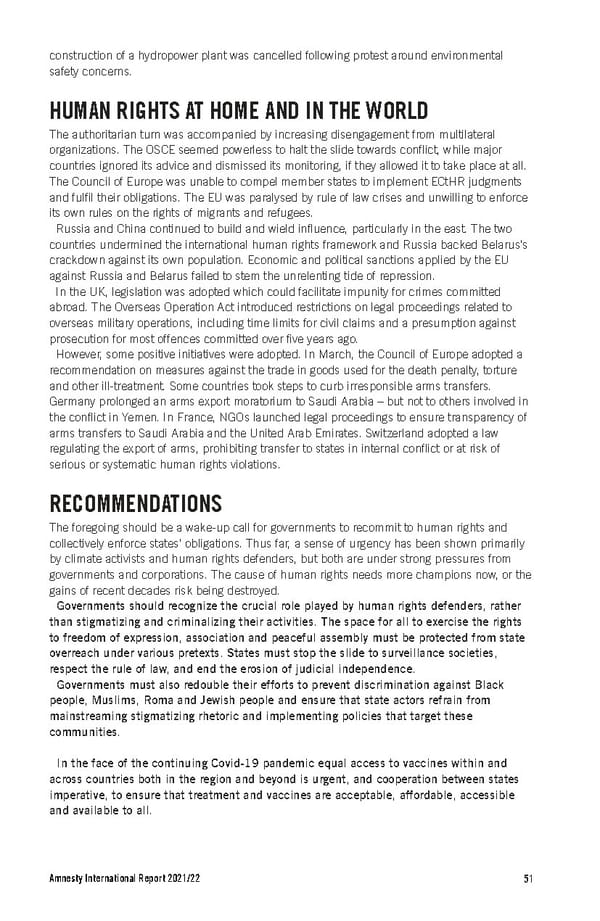construction of a hydropower plant was cancelled following protest around environmental safety concerns. HUMAN RIGHTS AT HOME AND IN THE WORLD The authoritarian turn was accompanied by increasing disengagement from multilateral organizations. The OSCE seemed powerless to halt the slide towards conflict, while major countries ignored its advice and dismissed its monitoring, if they allowed it to take place at all. The Council of Europe was unable to compel member states to implement ECtHR judgments and fulfil their obligations. The EU was paralysed by rule of law crises and unwilling to enforce its own rules on the rights of migrants and refugees. Russia and China continued to build and wield influence, particularly in the east. The two countries undermined the international human rights framework and Russia backed Belarus’s crackdown against its own population. Economic and political sanctions applied by the EU against Russia and Belarus failed to stem the unrelenting tide of repression. In the UK, legislation was adopted which could facilitate impunity for crimes committed abroad. The Overseas Operation Act introduced restrictions on legal proceedings related to overseas military operations, including time limits for civil claims and a presumption against prosecution for most offences committed over five years ago. However, some positive initiatives were adopted. In March, the Council of Europe adopted a recommendation on measures against the trade in goods used for the death penalty, torture and other ill-treatment. Some countries took steps to curb irresponsible arms transfers. Germany prolonged an arms export moratorium to Saudi Arabia – but not to others involved in the conflict in Yemen. In France, NGOs launched legal proceedings to ensure transparency of arms transfers to Saudi Arabia and the United Arab Emirates. Switzerland adopted a law regulating the export of arms, prohibiting transfer to states in internal conflict or at risk of serious or systematic human rights violations. RECOMMENDATIONS The foregoing should be a wake-up call for governments to recommit to human rights and collectively enforce states’ obligations. Thus far, a sense of urgency has been shown primarily by climate activists and human rights defenders, but both are under strong pressures from governments and corporations. The cause of human rights needs more champions now, or the gains of recent decades risk being destroyed. Governments should recognize the crucial role played by human rights defenders, rather than stigmatizing and criminalizing their activities. The space for all to exercise the rights to freedom of expression, association and peaceful assembly must be protected from state overreach under various pretexts. States must stop the slide to surveillance societies, respect the rule of law, and end the erosion of judicial independence. Governments must also redouble their efforts to prevent discrimination against Black people, Muslims, Roma and Jewish people and ensure that state actors refrain from mainstreaming stigmatizing rhetoric and implementing policies that target these communities. In the face of the continuing Covid-19 pandemic equal access to vaccines within and across countries both in the region and beyond is urgent, and cooperation between states imperative, to ensure that treatment and vaccines are acceptable, affordable, accessible and available to all. Amnesty International Report 2021/22 51
 Amnesty International Report 2021/22 Page 50 Page 52
Amnesty International Report 2021/22 Page 50 Page 52